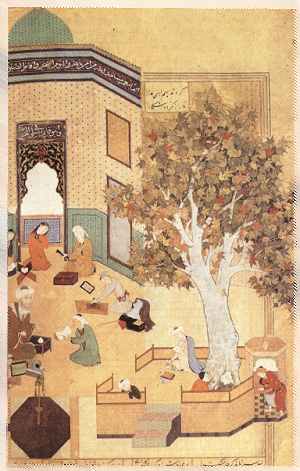
 5.
He was a master in exegesis of the Quran,
a scholar of jurisprudence
, and one of the greatest scholars
qualified to give legal decisionsin Madinah
.
Jafar
5.
He was a master in exegesis of the Quran,
a scholar of jurisprudence
, and one of the greatest scholars
qualified to give legal decisionsin Madinah
.
Jafar  acquired both the
external religious knowledge, as well as the internal confirmation of its
reality in the heart. The latter was reflected in his many visions and
miraculous powers
, too numerous to tell.
acquired both the
external religious knowledge, as well as the internal confirmation of its
reality in the heart. The latter was reflected in his many visions and
miraculous powers
, too numerous to tell.
I have discovered—and exaggeration is not in my nature—
That He who is my sustenance will come to me.
I run to Him, and my quest for Him is agony for me.
Were I to sit still, He would come to me without distress.
—Urwa ibn Adhina [1]
 The son of Imam Muhammad al-Baqir
The son of Imam Muhammad al-Baqir![]() ,
son of al-Imam Zain al-Abidin
,
son of al-Imam Zain al-Abidin![]() ,
son of Husayn
,
son of Husayn ![]() , son of Ali
ibn Abi Talib
, son of Ali
ibn Abi Talib ![]() , ibn Muhammad
, ibn Muhammad
![]() was born on the eighth of
Ramadanin the year 83 AH/702 CE. His motherwas the daughter of
al-Qasim, great granddaughter of Abu Bakr as-Siddiq
was born on the eighth of
Ramadanin the year 83 AH/702 CE. His motherwas the daughter of
al-Qasim, great granddaughter of Abu Bakr as-Siddiq![]() .
.
He spent his life in worship and acts of piety for the
sake of God. He rejected all positions of fame in favor of isolation from the
mundane world. One of his contemporaries, Umar ibn Abil-Muqdam, said,
“When
I look at Jafar ibn Muhammad I see the lineage and the secret of the Prophet
Muhammad
![]() united in him.”
united in him.”
 Jafar ibn Muhammad
Jafar ibn Muhammad
![]() received from the Prophet
received from the Prophet
![]() two lines of inheritance:
the secret of the Prophet
two lines of inheritance:
the secret of the Prophet ![]() through Ali
through Ali ![]() and through
Abu Bakr
and through
Abu Bakr ![]() .
.
In him the two lineages met and for that reason he was called “Inheritor of the Prophetic Station and of the Truthful Station .”
In him was reflected the light of the knowledge of Truth and Reality. That light shone forth and that knowledge was spread widely through him during his lifetime.
Jafar (as) narrated from his father, Muhammad al-Baqir![]() ,
that a man came to his grandfather, Zain al-Abidin
,
that a man came to his grandfather, Zain al-Abidin
![]() ,
and said:
,
and said:
“Tell me about Abu Bakr!” He said, “You mean as-Siddiq?”

The man said, “How do you call him as-Siddiq when he is against you, the
family of the Prophet
![]() ?”
He replied, “Woe to you. The Prophet
r
called him ‘as-Siddiq’ and God accepted his title of as-Siddiq. If you want
to come to me, keep the love
of Abu Bakr and Umar in your heart.”
?”
He replied, “Woe to you. The Prophet
r
called him ‘as-Siddiq’ and God accepted his title of as-Siddiq. If you want
to come to me, keep the love
of Abu Bakr and Umar in your heart.”
Jafar (as) said:
The best intercession that I hope for is the intercession of Abu Bakr as-Siddiq .”
The following invocation is reported from Jafar
as-Sadiq
![]() :
:
O God, You are my witness that I love
Abu Bakr and I love Umar and if what I
am saying is not true may God cut me off from the intercession
of Muhammad
![]() .
.
He took the knowledge of the Traditions from two sources: from his father, through Ali t, and from his maternal grandfather, al-Qasim . Then he increased his knowledge of the Traditions by sitting with Urwa, Aata, Nafi,and Zuhri. The two Sufyans, Sufyan al-Thawri and Sufyan bin Ayinah, Imam Malik, Imam Abu Hanifa, and al-Qattan all narrated Traditions through him, as did many others from later scholars of the Traditions.
Once, someone complained to Mansur, the governor of Madinah, about Jafar (as). They brought him before Mansur and asked the man who had complained, “Do you swear that Jafar did as you say?” He said, “I swear that he did that.” Jafar (as) said, “Let him swear that I did what he accused me of and let him swear that God punish him if he is lying.” The man insisted on his complaint, and Jafar (as) insisted that he take the oath. Finally, the man accepted to take the oath. No sooner were the words of the oath out of his mouth than he fell down dead.
Once he heard that Hakim ibn al-Abbas al-Kalbicrucified his own uncle Zaid on a date palm. He was so unhappy about this that he raised his hands and said, “O God send him one of your dogs to teach him a lesson.” Only a brief time passed before a lion in the desert ate Hakim. Imam at-Tabarinarrates that Wahb said:
I heard Layth ibn Saad say, “I went on pilgrimage in the year 113 AH/731 CE. After I performed the afternoon prayer, I was reading some verses of the Holy Quran when I saw someone sitting beside me invoking God saying, ‘Ya Allah, Ya Allah...’ repeatedly until he lost his breath. He then continued by saying, ‘Ya Hayy, Ya Hayy...’ until his breath was again lost. He then raised his hands and said, ‘O God, I have the desire to eat grapes, O God give me some. And my robe is becoming so old and tattered. Please, O God, grant me a new one.’
“He had hardly finished his words before a basket of grapes appeared in front of him while at that time there were no grapes in season. Beside the basket of grapes there appeared two cloaks more beautiful than I had ever seen before.
I said, ‘O my partner let me share with you.’ He said, ‘How are you a partner?’ I replied, ‘You were praying and I was saying ‘amin’.’ Then Imam Jafar (as) said, ‘Then come and eat with me,’ and he gave me one of the two cloaks .
Then he walked off until he met a man who said, ‘O son
of the Prophet ![]() , cover me because I have nothing but these
tattered garments to cover me.’ He immediately gave him the cloak
that he had just received. I asked that man, ‘Who is
that?’ He replied, ‘That is the great imam, Jafar as-Sadiq
, cover me because I have nothing but these
tattered garments to cover me.’ He immediately gave him the cloak
that he had just received. I asked that man, ‘Who is
that?’ He replied, ‘That is the great imam, Jafar as-Sadiq![]() .’ I ran after him to find him but he had disappeared.”
.’ I ran after him to find him but he had disappeared.”
This is only a sample of the many anecdotes and stories
of the miraculous powers
of Jafar as-Sadiq ![]() . From his knowledge he
said to Sufyan al-Thawri
, “If God bestows on you a favor, and you
wish to keep that favor, then you must praise and thank Him excessively,
because He said,
. From his knowledge he
said to Sufyan al-Thawri
, “If God bestows on you a favor, and you
wish to keep that favor, then you must praise and thank Him excessively,
because He said,
” He also said, “If the door of provision is closed for you, then make a great deal of begging for forgiveness because God said, ‘Seek forgiveness of your Lord, certainly Your Lord is oft-Forgiving.’ (11:52)”And he said to Sufyan,
“If you are upset by the tyranny of a Sultan or other oppression that you witness, say: ‘There is no change and no power except with God,’ (18:39)
because it is the key to relief and one of the treasures of Paradise.”
From His Sayings
The letter of the Arabic
alphabet, nun
,(ن)
at the beginning of Surah Qalam
(Chapter
68 of Quran) represents the light of pre-Eternity
, out of which God created all creations, and which is Muhammad
![]() .
.
That is why He said in the same verse, “Truly you are of a sublime nature.” (68:4)—that is, you were privileged with that light from pre-Eternity.
God, Almighty and Exalted, told the lower world, ”Serve the one who serves Me and tire the one who serves you.”
Prayer is the pillar of every pious person. Pilgrimage is the sacred struggle of every weak one. The poor-due of the body is fasting. The one who asks for God’s blessings without performing good deeds is like one trying to shoot an arrow without a bow .
Open the door of provision by giving donations. Fence in your money with the payment of the poor-due.
The best is he who wastes not.
Planning is the foundation of your life. To act prudently is the basis of intellect.
Whoever makes his parents sad has denied their rights on him.
The jurists are the trustees of the Prophet r. If you find the jurists sticking to the company of the sultans, say to them, “This is forbidden,” as the jurist cannot express his honest opinion under the pressure of the sultan’s proximity.
No food is better than piety and there is nothing better than silence. No enemy is more powerful than ignorance. No illness is greater than lying.
If you see something you do not like in your brother, try to find from one to seventy excuses for him. If you cannot find an excuse, say, “There might be an excuse, but I do not know it.”
If you hear a word from a Muslim that is offensive, try to find a good meaning for it. If you do not find a good meaning for it, say to yourself, “I do not understand what he said,” in order to keep harmony between Muslims.
Jafar as-Sadiq t passed away in 148 AH/765 CE. He was buried in Jannat al-Baqi, in the same graveyard as that of his father, Muhammad al-Baqir t, his grandfather, Zain al-Abidin t, and the uncle of his grandfather, Hasan ibn Ali t. He passed the secret of the Golden Chain to his successor, Grandshaykh Tayfur Abu Yazid al-Bistami, more commonly known as Bayazid al-Bistami. %